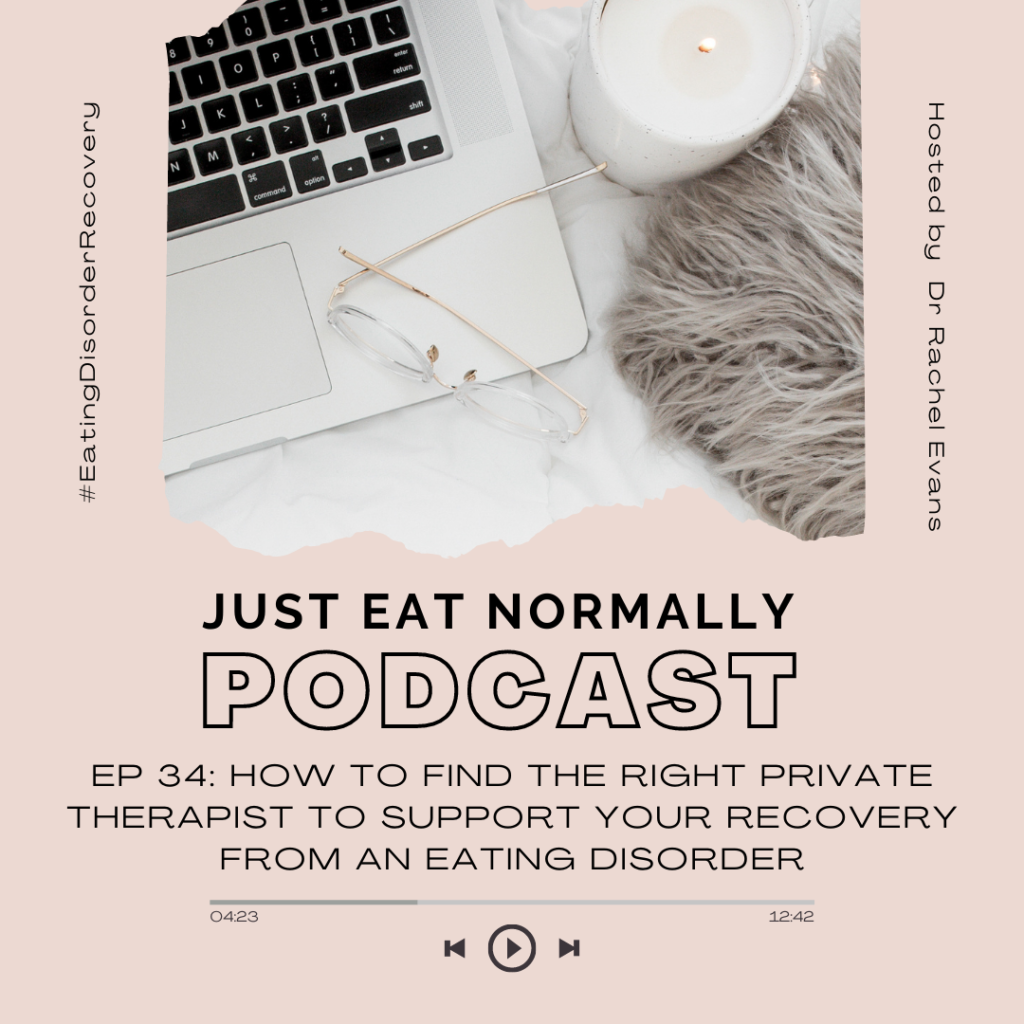New bite-sized episode of the Just Eat Normally Podcast sharing a few things to think about if you’re looking for a private therapist to help support your recovery from an eating disorder.
I’ve also outlined the main points if you scroll down on this post.

Please remember that this podcast shares opinions and information, it isn’t for the diagnosis or treatment of an eating disorder, mental or physical health issues.
LISTEN ON
or search “Just Eat Normally” on your podcast platform
How to find the right private therapist for eating disorder recovery
I know it can be tricky to find a therapist. It either seems like there is no one who can help or there there are dozens of people and you don’t know who to choose!
Here are some things you might want to think about (disclaimer: it’s just some ideas and not an exhaustive list of everything!).
Where do I find a private eating disorder therapist?
You can find specialist therapists by Googling “eating disorder therapist near me’, which funny enough seems to be quite accurate because when my neighbours did this (they were looking for someone to help with an interview for their company), my website came up! Similarly, you can Google search for therapists specifically in your town/city.
If you’re in the UK then you can look on directories from the National Centre for Eating Disorders and BEAT for eating disorder recovery specialists, or Psychology Today who have a broader range of therapists and you would have to filter them by specialism.
How do I narrow down the list of potential eating disorder therapists?
Before you search, think about your criteria.
You might have a very set budget for sessions that you can’t exceed, and so it wouldn’t make sense to contact therapists who charge over that price point. Similarly, think about your preference in terms of the frequency of sessions and location (online, phone or face-to-face).
You might also have an idea about the type of therapy you would like, maybe based on previous experience or your knowledge of yourself. For example, approaches like Cognitive-Behavioural Therapy are quite structured and you would be asked to complete ‘homework’ between sessions, which might sound appealing or totally awful to you! Maybe you would like a less structure approach. Often a therapist will have information in their profile about their training and approach/s to therapy.
I think that gut-instinct can be useful to help you create a short-list. Whenever I am looking for a coach or someone to support me, I always look for the people I feel most drawn to from their photo/profile/website and then out of the short list will evaluate how well they fit my criteria. That might mean I am flexible on some criteria if I really like the person or might mean that even though I feel drawn to someone I accept that we wouldn’t be a good fit to work together and so cross them off the list.
When should I message a therapist?
Please remember that therapists want to give you the best support they can, however they are also running a business and have a limited amount of time/energy. It’s not really fair to message a therapist for advice or to get them to explain general concepts to you if you have no intention of working with them.
My suggestion would be to only message a therapist when you have read their profile/website carefully and need additional information to help you decide if you want to work with them or if you are feeling positive about working with them.
DO NOT message therapists who aren’t a good fit for your criteria. Often therapists can be a bit flexible on aspects of care, but they might not be as flexible as you would like them to be and I’ve found that potential clients can be quite disappointed when they really like me but I don’t offer the support they’re looking for. That doesn’t feel good for the therapist or potential client, so I would say to only message when it seems like a good fit or you are willing to compromise on some aspects if the therapist can’t/won’t.
For example, my clients commit to work with me for a minimum of 3 months, and typically 6 months in the Nourish Programme, so that we can create a plan of action and work towards full recovery. I don’t offer sessions on a ‘drop-in whenever you fancy’ basis like some other therapists do because I don’t think it enables me to give the quality of service and help my clients get the results that they want. So if someone messages me and asks for a one-off 50-minute session or to see me once a month, then I would say no.
Likewise, I made the decision not to work with under 18s, which I think is clear on my Psychology Today profile, and I have put in the FAQ section on my website (although maybe I could make it a bit clearer). So it’s a waste of everyone’s time emailing to ask if I will work with someone under 18, because the answer is no. I do reply to all enquiries and suggest ways to find a therapist, but I think if a therapists boundaries are clear then it makes more sense to spend your time messaging those who are clearly suitable than those who are probably not.

[…] so that you can be seen by a GP who has more training or experience in the area. You can also reach out directly to a therapist or dietician who is specifically trained in eating disorders and […]